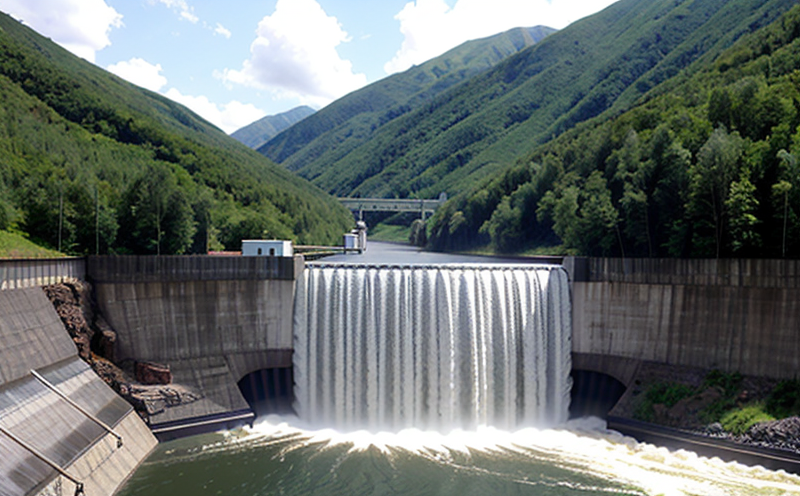ASTM D4253 Compaction Testing of Hydropower Dam Soils
The ASTM D4253 standard is a widely recognized method used to determine the compaction characteristics of granular soils intended for use in the construction of hydropower dams. This testing is crucial because it ensures that the soil used meets the necessary density requirements, which directly impacts the structural integrity and durability of the dam.
The process involves compacting soil samples under a controlled load to different specified densities and then measuring the corresponding unit weights at each compaction level. The goal is to identify the optimal moisture content and compactive effort that provide the required density for the construction material, ensuring it can withstand the hydrostatic pressure exerted by water in hydropower systems.
The test setup typically includes a cylindrical mold with a fixed volume, where soil samples are added incrementally and compacted using a plunger of specific dimensions. The compaction is controlled to ensure uniformity across all specimens tested. The apparatus used for this testing must adhere strictly to ASTM D4253 specifications to guarantee accurate results.
Accurate measurement of the unit weight at each compaction step is critical, and this is often achieved using sensitive balance scales. The moisture content of the soil samples is also measured precisely before and after compacting them into the mold. This information helps in understanding how water affects the density of the soil under the applied load.
Understanding the relationship between soil moisture content and compaction is vital for engineers designing hydropower dams, as it directly influences the performance of the structure over its operational life. By ensuring that the soils used are compacted to the specified densities, the integrity of the dam can be maintained, thereby reducing the risk of failure due to inadequate structural support.
The ASTM D4253 test is particularly important in hydropower applications because it helps prevent issues such as seepage and erosion, which could compromise the stability of the dam. The testing process ensures that the soil used for constructing these critical structures meets the stringent requirements set by international standards, thereby enhancing safety and reliability.
In summary, ASTM D4253 compaction testing is an essential tool in ensuring the quality and performance of granular soils used in hydropower dam construction. By providing accurate data on moisture content and compaction behavior, this test contributes significantly to the overall success of these vital infrastructure projects.
Why It Matters
The importance of ASTM D4253 testing for hydropower dams cannot be overstated. Ensuring that the soils used in dam construction meet the required compaction criteria is critical to the safety and longevity of these structures. Hydropower dams are subject to significant hydrostatic pressure, which can lead to structural failure if the soil does not achieve the necessary density.
Compacted soil plays a crucial role in providing the necessary support for the dam's foundation. If the soil is not compacted adequately, it could lead to seepage through weak points in the structure, causing potential erosion and compromising the integrity of the entire system. This can have severe consequences, including loss of life and significant financial damage.
The ASTM D4253 test helps engineers identify the optimal moisture content and compactive effort that will achieve the required density for the soil used in dam construction. By adhering to this standard, constructors ensure that the soils used are suitable for the specific conditions under which they will be placed. This ensures that the dam can withstand the environmental pressures it faces over its operational life.
The reliability and safety of hydropower dams are directly linked to the quality of the materials used in their construction. By implementing ASTM D4253 testing, constructors can have confidence that the soils they use meet the necessary standards, thereby enhancing the overall performance and longevity of these critical infrastructure projects.
Applied Standards
| Standard | Description |
|---|---|
| ASTM D4253-18 | This standard specifies the procedure for determining the compaction characteristics of granular soils intended for use in the construction of hydropower dams. |
| ISO 17888:2019 | An international standard that provides guidance on the testing and evaluation of geosynthetics used in civil engineering applications, including dam construction. |
| EN 12682-4:2013 | This European standard outlines the requirements for laboratory compaction tests using a vibrating table, which can be used as an alternative to ASTM D4253 in certain situations. |
| IEC 62479-2:2018 | An international standard that specifies the testing methods and acceptance criteria for electrical resistivity of geosystems, which can be relevant for evaluating soil properties. |
The ASTM D4253 standard is particularly important in ensuring that granular soils used in hydropower dam construction meet the required compaction characteristics. This test helps engineers identify the optimal moisture content and compactive effort to achieve the necessary density, ensuring the structural integrity of the dam.
Eurolab Advantages
EuroLab offers comprehensive services for ASTM D4253 testing of hydropower dam soils. Our state-of-the-art facilities and highly skilled personnel ensure that every test is conducted with precision and accuracy, adhering strictly to international standards.
We provide a range of services tailored to meet the specific needs of our clients in the energy sector. From initial consultation on soil selection to final testing and reporting, we offer end-to-end solutions designed to help you achieve compliance with industry regulations and best practices.
Our facilities are equipped with the latest instrumentation and equipment necessary for performing ASTM D4253 tests effectively. Our team of experts has extensive experience in this field, ensuring that every test is conducted accurately and efficiently.
EuroLab's commitment to quality and excellence extends beyond just testing services. We also offer training programs and consulting services to help our clients understand the nuances of these tests and how they can be applied effectively in their projects.





